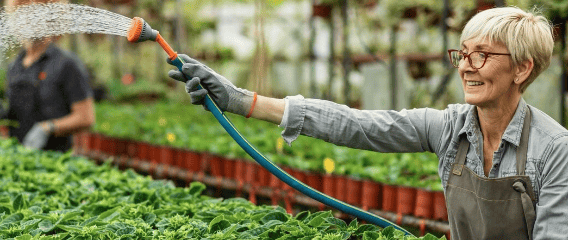Gardening Activities to Promote Well-Being for Seniors


Gardening has long been celebrated as a soothing and rewarding hobby. For seniors, it offers much more than just beautiful flowers or homegrown veggies. It’s an activity that nurtures physical health, mental well-being, and a sense of purpose. As we age, finding accessible activities that promote well-being can be challenging, but gardening provides the perfect solution. Here’s how:
1. Physical Exercise in a Gentle Form
While gardening may not seem like a typical workout, it offers a fantastic way to keep seniors moving. The process of digging, planting, watering, and harvesting requires various physical motions that strengthen muscles, improve flexibility, and promote joint health. Gardening can also help with balance and coordination, lowering the risk of falls. Tasks can be modified to suit physical limitations, such as using raised garden beds or lightweight tools, making it accessible to many seniors.
2. Boosts Mental Health and Reduces Stress
Gardening isn’t just about the body—it also has profound effects on mental health. Studies have shown that spending time in green spaces can reduce symptoms of anxiety and depression. For seniors, especially those living alone or in assisted living facilities, the simple act of tending to plants can provide a sense of purpose, reduce feelings of isolation, and instill calmness. The rhythmic activities involved in gardening help clear the mind and provide a meditative experience, often referred to as "horticultural therapy."
3. Cognitive Stimulation
Gardening is an activity that requires planning, decision-making, and attention to detail, all of which engage the brain. For seniors dealing with cognitive decline or early-stage dementia, gardening can be a beneficial form of stimulation. Remembering which plants need water, sunlight, or trimming provides seniors with cognitive challenges that keep their minds active. Additionally, working with different textures, colors, and scents of plants can trigger memories and stimulate the senses, making it a therapeutic exercise for cognitive health.
4. Promotes Social Interaction
Whether in community gardens, retirement homes, or with neighbors, gardening can foster social interaction. Seniors often face loneliness, but participating in a gardening group or club provides opportunities to connect with others who share a similar passion. This social engagement helps build relationships, reduces feelings of isolation, and creates a supportive network of like-minded individuals.
5. Nutritional Benefits
For those who enjoy growing their own fruits, vegetables, or herbs, gardening offers the added benefit of producing fresh, organic food. Growing your own produce encourages healthy eating habits, as the effort involved in cultivating the plants often leads to greater appreciation for healthy foods. Seniors can grow easy-to-care-for plants like tomatoes, leafy greens, and herbs, which are rich in essential nutrients that support overall health.
6. Enhances Self-Esteem and Sense of Accomplishment
There’s something immensely rewarding about watching a seed grow into a flourishing plant. For seniors, this process can create a profound sense of accomplishment. It provides a purpose and daily routine, both of which are essential for emotional well-being. Having the responsibility of caring for plants can boost self-esteem and create a sense of pride in their achievements, especially for those who may feel they have lost a sense of productivity in other areas of life.
7. Connecting with Nature
Lastly, gardening offers a chance to connect with nature. Many seniors grew up in an era where being outdoors and working with their hands was common, so gardening brings back those fond memories. This connection to the earth is grounding and helps create a sense of belonging, tranquility, and joy.
Getting Started with Gardening for Seniors
If you or a loved one is considering taking up gardening, here are a few tips to get started:
Start small: A few pots of herbs on a windowsill or a small raised bed can be more than enough to reap the benefits.
Adapt the environment: Raised beds or container gardens can reduce the need to bend over, making it more comfortable for seniors with mobility issues.
Choose easy-care plants: Begin with low-maintenance plants like succulents, tomatoes, or marigolds, which are forgiving and don’t require constant attention.
Safety first: Ensure there are shaded areas to avoid sunburn, provide proper hydration, and avoid over-exertion.
In summary, gardening is a powerful tool to promote physical, mental, and emotional well-being in seniors. Whether it’s nurturing a flower to bloom or growing fresh vegetables, the benefits of gardening are vast and far-reaching. So, why not dig in and let the garden work its magic?


